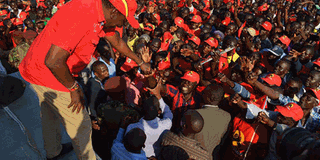Why politics and journalism need each other

President Uhuru Kenyatta addresses a rally at Adungosi,Teso South in Busia County on July 27,2017. That journalism and politics need each other is self-evident even though our politics is based on personality attacks. PHOTO | ONDARI OGEGA | NATION MEDIA GROUP
What you need to know:
- A politician may often seek to make a tingling statement merely because that is the only way the statement can make it into tomorrow’s dailies.
- Yet most political statements arriving at a news desk are below-the-belt attacks on rivals
That politics and journalism need each other is self-evident.
A politician may often seek to make a tingling statement merely because that is the only way the statement can make it into tomorrow’s dailies.
Only thus can the constituents know that he or she is busy on the mission to which they elected him or her.
It is thus that politicians can produce eye-catching headlines and enhance their images.
PERSONALITY ATTACKS
Yet most political statements arriving at a news desk are below-the-belt attacks on rivals.
Our politics is composed of personality “attacks”.
Take a headline in the Nation of August 15: “Mungiki attack reports in Nairobi slums false alarm, says police boss.”
Here the word attack seeks to describe the noun reports.
Such “attack reports” abound in our media.
BRAINIEST SPECIES
Yet cheating, murder, rape and robbery are the ways of a species which claims to be the earth’s brainiest.
Wouldn’t a brainy species know better than to starve any member?
In what does civilisation consist whenever one race seeks to live a heavenly life at the expense of other humans on account merely of such an inessential evolutionary difference as skin colour?
As a thinking missionary, how do you expect me to respect a god who helps your race to rob my people?
Here the word attack was used, not as a noun, but as a verb.
NEWSPAPER STORY
What the Mungiki had reportedly “slammed” was only a newspaper story.
Because such attacks are usually from a terrorist organisation, the headline could have meant that the Mungiki had struck again.
Yet, here, no terrorist was the culprit.
The police had criticised a Nation story only because the dailies use the verbs “to attack” and “to criticise” synonymously.
Yet whenever the President urges the media to write positively, he is not “attacking”.
MEASURED WORDS
He does not mean that the editors should paint a ruling-party politician snow-white even when the politician has behaved like an animal.
Our President often urges us to use measured words – words which, even when critical, will encourage Kenyans to do only things that can add fuel to national amity and development.
If our politicians habitually used language that encourages co-operation, we would realise what Mzee Kenyatta called Harambee and take a positive direction overnight to put paid to all the negativities that thwart all our attempts to become a single nation.
The problem is that our headline writers often do use the verb to attack to describe any mere criticism.
No, whenever the President cites a certain negativity in our media, it should only encourage the editors to eliminate that negativity.
CRITICISM
No, we, in the media, cannot claim to be above criticism.
We are aware of our shortcomings.
Whenever the President criticises any media activity, we should remember that to err is human.
The government may be trying merely to offer what the newspaper editors themselves should welcome as friendly advice.
Yes, some government officials may use unnecessarily rough words.
OVER-REACTION
But the same is often true of some of the media operators.
The point is that both sides should measure their words against each other.
For instance, the verb attacked (above) may be an over-reaction.
The President may not have meant to attack the media.
DEADLY WEAPONS
For, as the independent media use it, the word attack was probably well meant.
Though contradictory, the more civilised a nation is, the more it has accumulated the deadliest weapons aimed only at other human beings.
A most civilised nation it was that very recently hurled the most hideous nuclear weapons to transform a human habitat into Gehenna.
Yet some readers might have read the word “attack” as a verb, mistaking it to mean that the newspaper report was what had goaded terrorists to react with the violence characteristic of terrorists.





